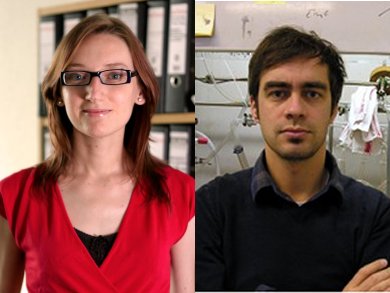Cristina Nevado (left), University of Zurich, and Clément Mazet (right), Université de Genève, both Switzerland, have been awarded the Werner Prize of the Swiss Chemical Society (SCS). The Werner Prize is awarded for outstanding research to young scientists who are under the age of 40 and do not have a tenured position. It is endowed with CHF 10,000 (EUR 8,100) and is one of the top annual prizes of the SCS. The 2013 prize was shared equally between the two winners.
The prize was presented at the Spring Meeting of the SCS in Villigen, Switzerland, on April 19, 2013, where each awardee delivered a prize lecture.
Cristina Nevado was recognized for her work on the development of AuI/AuIII-catalyzed reactions. Nevado studied chemistry at the Universidad Autónoma de Madrid, Spain, where she received her Ph.D. in 2004 for work supervised by Antonio M. Echavarren. She then joined the group of Alois Fürstner, Max Planck Institute for Coal Research, Mülheim an der Ruhr, Germany, as a postdoctoral researcher, and in 2007, she started her independent career at the University of Zurich.
Nevado´s research interests are in the areas of natural product synthesis, drug discovery, and late-transition-metal-catalyzed reactions. Recently this has included the gold-catalyzed rearrangement of propargyl acetates and regio- and enantioselective aminofluorination reactions.
Clément Mazet was honored for his work in asymmetric catalysis. Mazet studied chemistry at the Université Louis Pasteur, Strasbourg, France, and received his Ph.D. under the supervision of Lutz H. Gade in 2002. He was a postdoctoral researcher with Andreas Pfaltz at the University of Basel, Switzerland, from 2003–2005 and with Eric Jacobsen at Harvard University, Cambridge, MA, USA, from 2006–2007. He joined the Université de Genève in 2007.
Mazet´s research involves mechanistic and synthetic organic and organometallic chemistry, in particular asymmetric catalysis. Recently this has included chiral P, N ligands for palladium-catalyzed reactions and iridium-catalyzed reactions.
Selected publications by Cristina Nevado:
- Regio- and Enantioselective Aminofluorination of Alkenes,
Wangqing Kong, Pascal Feige, Teresa de Haro, Cristina Nevado,
Angew. Chem. Int. Ed. 2013, 52(9), 2469–2473.
DOI: 10.1002/anie.201208471 - Gold-Catalyzed 1,2-/1,2-Bis-acetoxy Migration of 1,4-Bis-propargyl Acetates: A Mechanistic Study,
Teresa de Haro, Enrique Gómez-Bengoa, Riccardo Cribiú, Xiaogen Huang, Cristina Nevado,
Chem. Eur. J. 2012, 18(22), 6811–6824.
DOI: 10.1002/chem.201103472
Selected publications by Clément Mazet:
- Atropoisomeric (P,N) Ligands for the Highly Enantioselective Pd-Catalyzed Intramolecular Asymmetric α-Arylation of α-Branched Aldehydes,
Pradeep Nareddy, Luca Mantilli, Laure Guénée, Clément Mazet,
Angew. Chem. Int. Ed. 2012, 51(16), 3826–3831.
DOI: 10.1002/anie.201108061 - Structure–Activity Relationship in the Iridium-Catalyzed Isomerization of Primary Allylic Alcohols,
Luca Mantilli, David Gérard, Céline Besnard, Clément Mazet,
Eur. J. Inorg. Chem. 2012, 20, 3320–3330.
DOI: 10.1002/ejic.201200369



